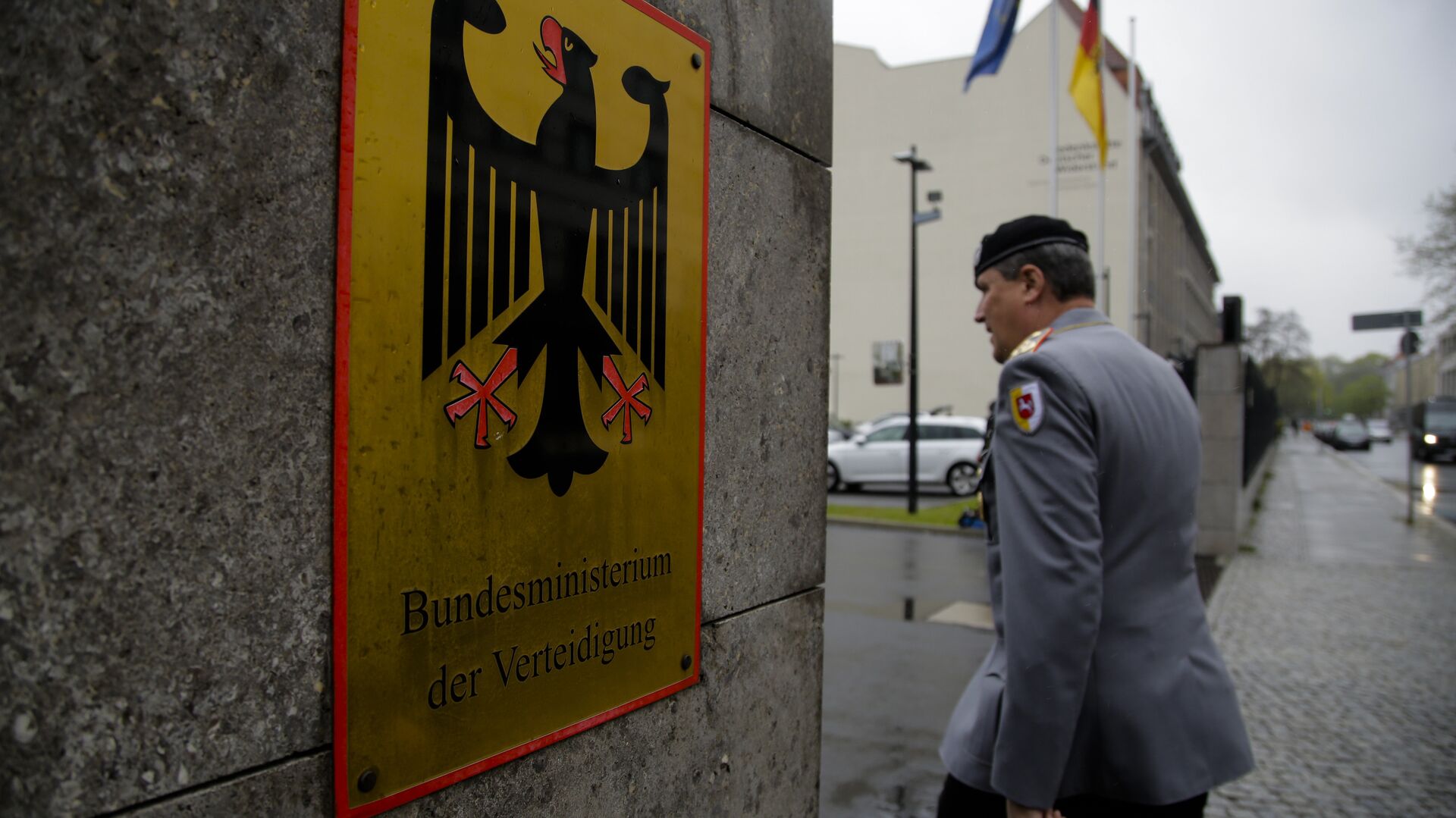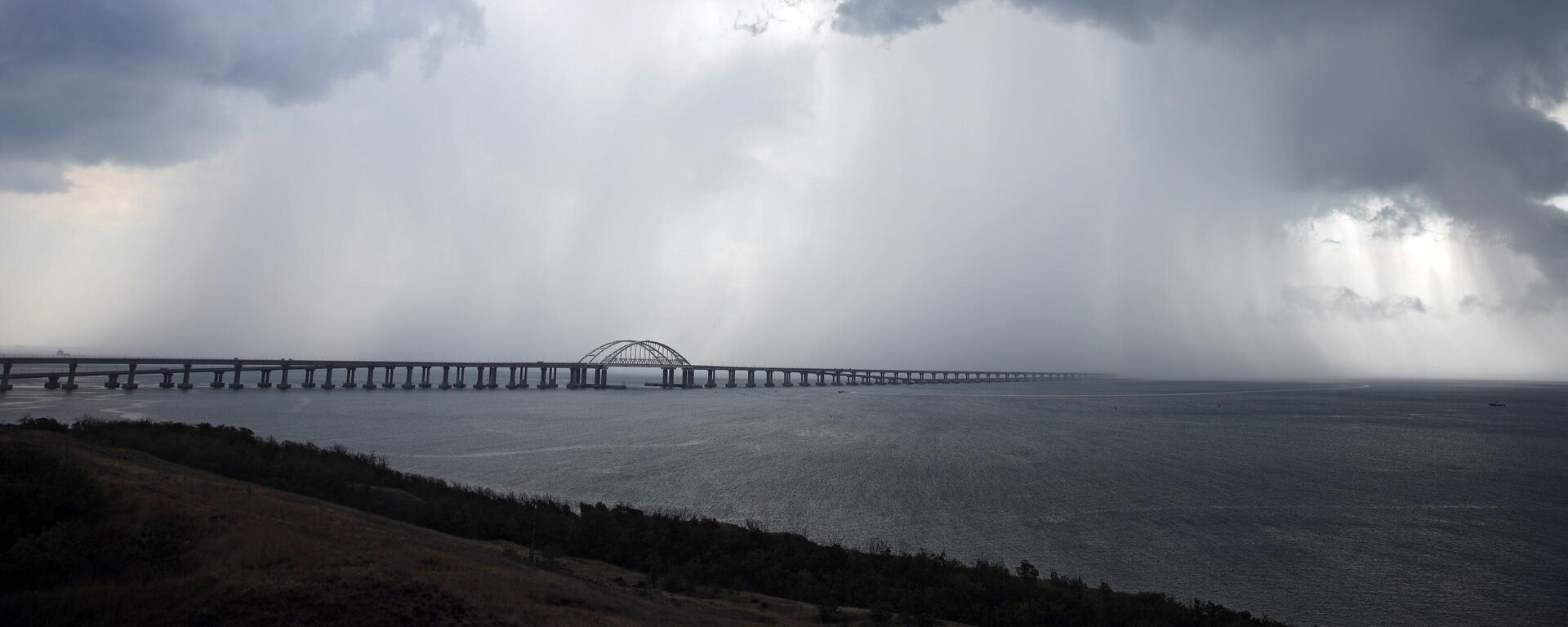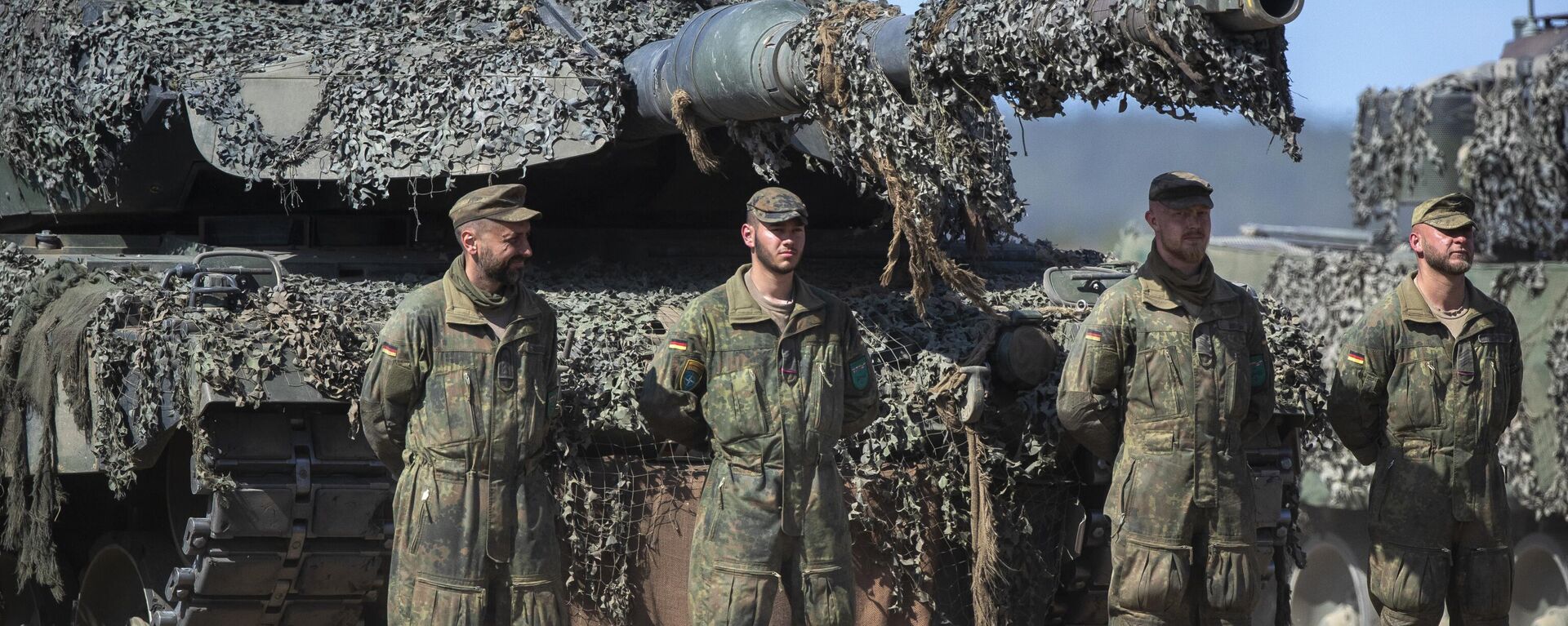https://sputnikglobe.com/20240303/germany-to-sick-to-its-no-taurus-missiles-to-ukraine-decision---report-1117096374.html
Germany to Stick to its 'No Taurus Missiles to Ukraine' Decision - Report
Germany to Stick to its 'No Taurus Missiles to Ukraine' Decision - Report
Sputnik International
Chancellor Olaf Scholz will not revise his opinion on the delivery of Taurus missiles to Ukraine in the wake of the leaked conversation between high-ranking German military officials, the Frankfurter Allgemeine Zeitung reported.
2024-03-03T06:45+0000
2024-03-03T06:45+0000
2024-03-03T07:30+0000
world
germany
olaf scholz
taurus cruise missile
ukraine
armed forces of ukraine
bundeswehr
https://cdn1.img.sputnikglobe.com/img/105328/29/1053282906_0:286:5485:3371_1920x0_80_0_0_a655be2d6804d5ce5607330e23d68f3e.jpg
Chancellor Olaf Scholz will not revise his opinion on the delivery of Taurus missiles to Ukraine in the wake of the leaked conversation between high-ranking German military officials, Frankfurter Allgemeine Zeitung reported.Scholz remains opposed to the transfer of the long-range cruise missiles to the Kiev regime, the publication wrote, citing sources close to the chancellor.The outlet added that Russia had “turned the tables” on Berlin by publishing the intercepted telephone conversation involving Bundeswehr representatives discussing a potential attack on the Crimea Bridge with the weapons. The bombshell leak, coupled with Olaf Scholz's acknowledgment that British and French troops are assisting the Ukrainians with firing SCALP and Storm Shadow long-range cruise missiles at Russian targets, feeds into Berlin’s Taurus “fiasco,” the German outlet summed up.Scholz can be expected to stick to his decision, while his “allies” will have increasingly more reason to doubt Germany, it added.On Friday, Margarita Simonyan, editor-in-chief of RT and the Rossiya Segodnya media group (Sputnik's parent company), published the text of a conversation among four Bundeswehr representatives on the WebEx platform discussing a potential attack on the Crimean Bridge with Taurus missiles and other issues. German news agency DPA reported that the leaked conversation, which took place on February 19, was authentic.The Russian Foreign Ministry has demanded an "immediate explanation" from Berlin of the audio recording. Foreign Ministry spokeswoman Maria Zakharova stressed in a statement that attempts by the German authorities "to dodge the question will be considered an admission of guilt."The German chancellor has been adamant that Taurus missiles, due to their range of up to 500 kilometers (310 miles) being long enough to hit Russian territory, could make Germany a party to the Ukraine conflict. “It’s a decision that I have taken as chancellor, and I stand by it in exactly the same way, that this is not something we can make available at this point in time,” Scholz was cited as saying at a recent event in Munich.Scholz also drew flak after he inferred that Germany would resist being drawn in to what the British and French militaries were doing by assisting Ukrainians to fire SCALP and Storm Shadow long-range cruise missiles.Taurus, Scholz said on February 26, is “a very far-reaching weapon,” and emphasized: “What is being done in the way of target control and accompanying target control on the part of the British and the French can’t be done in Germany. Everyone who has dealt with this system knows that.” Scholz further stated that “German soldiers must at no point and in no place be linked to targets this (Taurus) system reaches."The chancellor also suggested that "What Ukraine is missing is ammunition at all possible distances, but not decisively this thing from Germany.”It is hardly surprising that the UK, one of the most fervid supporters of the Kiev regime, was incensed by what it slammed as a "flagrant abuse of intelligence." Tobias Ellwood, the former chairman of the Commons Defense Committee, claimed the remarks by the German chancellor were "deliberately designed to distract from Germany’s reluctance to arm Ukraine with its own long-range missile system.” Not only do the developments come amid disagreements among Western countries on additional military aid to the Kiev regime, but they serve to give increasingly less credence to NATO countries' arguments that they are not directly involved in the Ukraine conflict.
https://sputnikglobe.com/20240301/full-transcript-of-german-top-military-officials-leaked-plot-to-attack-crimean-bridge-1117078481.html
https://sputnikglobe.com/20240302/germany-to-be-dragged-into-ukrainian-conflict-if-taurus-missiles-delivered---official-1117085880.html
germany
ukraine
Sputnik International
feedback@sputniknews.com
+74956456601
MIA „Rossiya Segodnya“
2024
News
en_EN
Sputnik International
feedback@sputniknews.com
+74956456601
MIA „Rossiya Segodnya“
Sputnik International
feedback@sputniknews.com
+74956456601
MIA „Rossiya Segodnya“
ukrainian crisis, ukraine, germany crimean bridge, germany ukraine, russia’s special military op in ukraine, special military operation, special military operational zone, special op zone, russian troops in special op zone, ukraine casualties in conflict, total ukrainian losses, how many people did ukraine loose, how many people did kiev loose, new russian weapons in ukraine, advanced russian weapons, russian defense ministry statements, latest russian military statements, what did shoigu say about ukraine, donetsk people’s republic, nato in ukraine, is nato in ukraine
ukrainian crisis, ukraine, germany crimean bridge, germany ukraine, russia’s special military op in ukraine, special military operation, special military operational zone, special op zone, russian troops in special op zone, ukraine casualties in conflict, total ukrainian losses, how many people did ukraine loose, how many people did kiev loose, new russian weapons in ukraine, advanced russian weapons, russian defense ministry statements, latest russian military statements, what did shoigu say about ukraine, donetsk people’s republic, nato in ukraine, is nato in ukraine
Germany to Stick to its 'No Taurus Missiles to Ukraine' Decision - Report
06:45 GMT 03.03.2024 (Updated: 07:30 GMT 03.03.2024) Olaf Scholz has repeatedly voiced his opposition to supplying the Kiev regime with long-range Taurus cruise missiles. During an event in Munich on Friday, the German chancellor again argued that delivering them to Ukraine would risk his country being drawn into the conflict.
Chancellor Olaf Scholz will not revise his opinion on the
delivery of Taurus missiles to Ukraine in the wake of the
leaked conversation between high-ranking German military officials,
Frankfurter Allgemeine Zeitung reported.
Scholz remains opposed to the transfer of the long-range cruise missiles to the Kiev regime, the publication wrote, citing sources close to the chancellor.
The outlet
added that Russia had “
turned the tables” on Berlin by publishing the
intercepted telephone conversation involving Bundeswehr representatives
discussing a potential attack on the Crimea Bridge with the weapons. The bombshell leak, coupled with Olaf Scholz's acknowledgment that British and French troops are assisting the Ukrainians with firing SCALP and Storm Shadow long-range cruise missiles at Russian targets, feeds into Berlin’s Taurus “
fiasco,” the German outlet summed up.
Scholz can be expected to stick to his decision, while his “allies” will have increasingly more reason to doubt Germany, it added.
On Friday, Margarita Simonyan, editor-in-chief of
RT and the
Rossiya Segodnya media group (
Sputnik's parent company), published the text of
a conversation among four Bundeswehr representatives on the WebEx platform discussing a potential attack on the Crimean Bridge with Taurus missiles and other issues. German news agency
DPA reported that the leaked conversation, which took place on February 19, was authentic.
The Russian Foreign Ministry has demanded an "immediate explanation" from Berlin of the audio recording. Foreign Ministry spokeswoman Maria Zakharova stressed in a statement that attempts by the German authorities "to dodge the question will be considered an admission of guilt."
The German chancellor has been adamant that Taurus missiles, due to their range of up to 500 kilometers (310 miles) being long enough to hit Russian territory, could make Germany a party to the Ukraine conflict.
“It’s a decision that I have taken as chancellor, and I stand by it in exactly the same way, that this is not something we can make available at this point in time,” Scholz was cited as saying at a recent event in Munich.
Earlier, in February, the German parliament, the Bundestag, voted in favor of a draft resolution submitted by Scholz's Social Democratic Party, the Free Democratic Party, and the Greens on the supply of long-range weapons systems to Ukraine. However, Taurus missiles are not mentioned in the document.
Scholz also drew flak after he inferred that Germany would resist being drawn in to what the British and French militaries were doing by assisting Ukrainians to fire SCALP and Storm Shadow long-range cruise missiles.
Taurus, Scholz said on February 26, is “a very far-reaching weapon,” and emphasized:
“What is being done in the way of target control and accompanying target control on the part of the British and the French can’t be done in Germany. Everyone who has dealt with this system knows that.” Scholz further stated that “German soldiers must at no point and in no place be linked to targets this (Taurus) system reaches."
The chancellor also suggested that "What Ukraine is missing is ammunition at all possible distances, but not decisively this thing from Germany.”
It is hardly surprising that the UK, one of the most fervid supporters of the Kiev regime, was incensed by what it slammed as a "flagrant abuse of intelligence." Tobias Ellwood, the former chairman of the Commons Defense Committee, claimed the remarks by the German chancellor were "deliberately designed to distract from Germany’s reluctance to arm Ukraine with its own long-range missile system.”
Not only do the developments come amid disagreements among Western countries on
additional military aid to the Kiev regime, but they serve to give
increasingly less credence to NATO countries' arguments that they are not directly involved in the Ukraine conflict.




